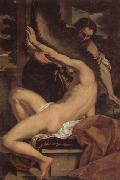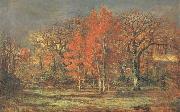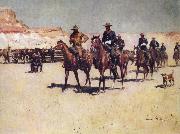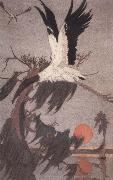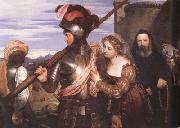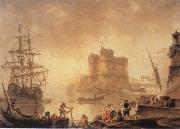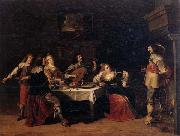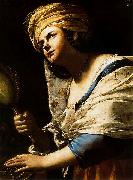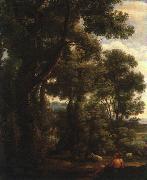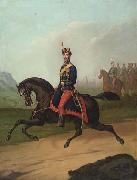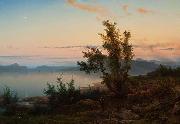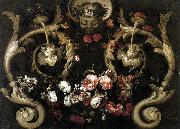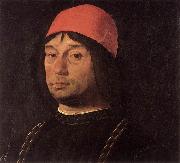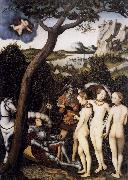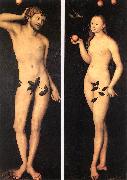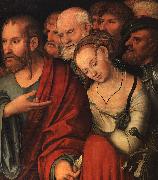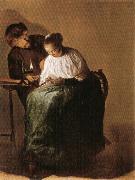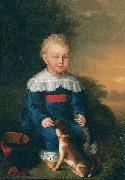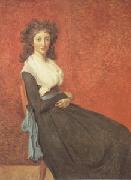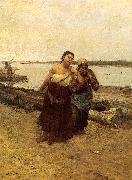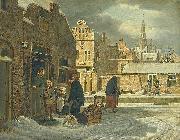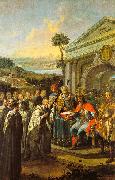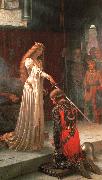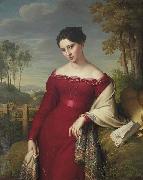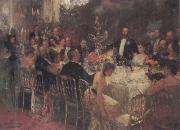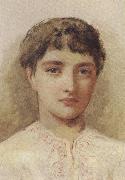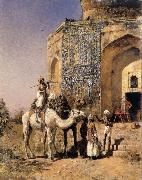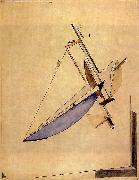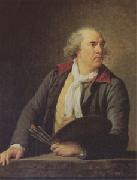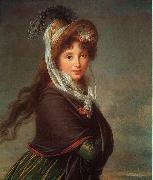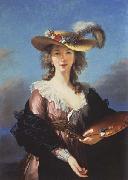|
|
|
|
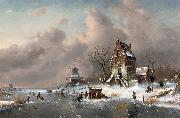 |
Charles Leickert
|
|
22 September 1816, Brussels - 5 December 1907, Mainz was a Belgian painter of Dutch landscapes.
Orphan Leickert first learned painting in The Hague under the supervision of landscape painters Bartholomeus van Hove, Wijnand Nuijen, and Andreas Schelfhout among many others. Leickert specialised in winter scenes, sometimes romanticising the sky in pale blues and bright pinks. He painted almost all his works in the Netherlands, from 1841-1848 in The Hague and from 1849-1883 in Amsterdam. In 1856, he became a member of the Royal Academy of Amsterdam. At the age of 71 he moved to Mainz, Germany where he later died in 1907.
|
|
|
|
|
|
|
|
|
|
|
|
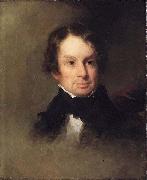 |
Charles Loring Elliott
|
|
1812-1868.
Elliott was born at Auburn, New York in the central part of the state. He began working as a painter in his region. After 10 years, he moved to New York City to study art under the painters John Trumbull and John Quidor, as well as to be in a bigger market for work.
After practicing portrait painting in central New York State for 10 years, Elliott took up residence in New York City in 1845. The following year he was elected to the National Academy of Design, which was a measure of recognition and helped him attract more clients.
Painting by Elliott of Samuel Putnam Avery, 1863Elliott was considered the best portraitist of his day. Although he never studied abroad, his technique is neither provincial nor uncertain. His method is mature, his drawing firm, his color fresh and clean, and his likenesses excellent, though somewhat lacking in sentiment.He was said to have painted over 700 portraits, mostly heads, as he had little idea of the composition of large canvases. He also painted figure pieces, including Don Quijote and Falstaff, and one landscape, The Head of Skaneateles Lake. |
|
|
|
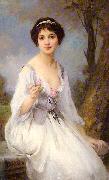 |
Charles-Amable Lenoir
|
|
(22 October 1860 - 1926) was a French painter. Like his mentor, William-Adolphe Bouguereau, he was an academic painter and painted realistic portraits as well as mythological and religious scenes. His artistic career was so prestigious that he won the Prix de Rome twice and was awarded the Legion d'honneur.
Lenoir was born in Châtellaillon, a small town just outside of La Rochelle. His mother was a seamstress and his father was a customs officer. When he was young, his father was reassigned and the family moved to Fouras. He did not start out in life as an artist, but instead began his education at a teachers' college in La Rochelle. Upon graduation, he worked as a teacher and supervisor at the lycee in Rochefort.
In August 1883 he was accepted into the École des Beaux-Arts de Paris, he also joined the Academie Julian where he was a student of William-Adolphe Bouguereau and Tony Robert-Fleury. Lenoir made his artistic debut at the Salon in 1887 and continued to exhibit there until his death. He was quickly noticed in the art world, and in 1889 won the Second Prix de Rome for his painting, Jesus et le paralytique (Jesus and a Sick Man with Palsy), and he won the First Prix de Rome the following year for Le Reniement de Saint Pierre (The Denial of St. Peter).His awards did not stop with the Prix de Rome; works shown at the Salons also won prizes, and he received a third-class medal in 1892 for Le Grenier a Vingt Ans (The Garret at twenty years) and a second-class medal in 1896 for La Mort de Sappho (The Death of Sappho). |
|
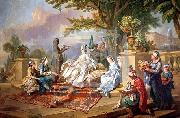 |
Charles-Amedee-Philippe van Loo
|
|
(25 August 1719 -15 November 1795) was a French painter of allegorical scenes and portraits.
He studied under his father, the painter Jean-Baptiste van Loo, at Turin and Rome, where in 1738 he won the Prix de Rome, then at Aix-en-Provence, before returning to Paris in 1745. He was invited to join the Academie Royale de Peinture et de Sculpture in 1747, and that year he married his cousin Marie-Marguerite Lebrun, daughter of the painter Michel Lebrun (died 1753).
Among his brothers were the painters François van Loo (1708-1732) and Louis-Michel van Loo (1707-1771).
|
|
|
|
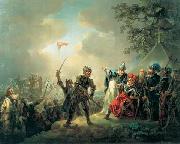 |
Christian August Lorentzen
|
|
(10 August 1749 - 8 May 1828) was a Danish painter. He was the instructor of Martinus Rørbye.
Christian August Lorentzen was born on 10 August 1749 as the son of a watchmaker. He arrived in Copenhagen around 1771 where he frequented the Royal Academy of Fine Arts but it is unclear whether he received formal training.From 1779 to 1782 he want abroad to develop his skills, visiting the Netherlands, Antwerp and Paris where he copied old masters. In 1792 he traveled to Norway to paint prospects.
In a number of painting, such as Slaget på Reden (1801, Danish Museum of National History and Den rædsomste nat (1807, Danish National Gallery, he documented key events from the English Wars between 1801 and 1814. Later in his career he mainly painted portraits, landscapes and scenes from Ludvig Holberg's comedies.
As a professor at the Royal Academy in Copenhagen from 1803 and until his death in 1828, he exercisized great influence on the next generation of painters such as Martinus Rørbye among others. |
|
|
|
|
|
|
|
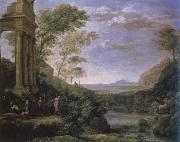 |
claude lorraine
|
|
Claude Lorrain (also Claude Gell??e or Le Lorrain) (Lorraine, c. 1600 ?C Rome, 21 or 23 November 1682) was an artist of the neo-classical era who was active in Italy, and is admired for his achievements in landscape painting. |
|
|
|
|
|
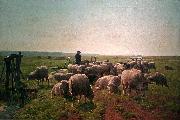 |
Cornelis Van Leemputten
|
|
(1841-1902) was a Belgian painter.
Born in Werchter, Cornelius van Leemputten is predominantly known for his landscapes with sheep, similar to the style of Charles Jacque. He began his painting career without formal training. He was well-known for his barnyard subjects. Leemputten eventually became a pupil of the Academy of Antwerp, though his style remained primarily self-taught.
Van Leemputten participated across several international exhibitions and received gold medals in Ghent in 1883, Edinburgh in 1886, Port Adelaide in 1887 and in Berlin in 1896. In 1895, he received the Knight of the Order of Leopold (Belgium).
|
|
|
|
|
|
|
|
|
|
|
|
|
|
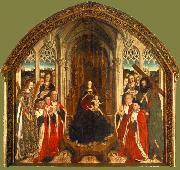 |
DALMAU, Lluis
|
|
Spanish Early Renaissance Painter, active 1428-1461 |
|
|
|
|
|
|
|
|
|
|
|
dioscoro teofilo de la puebla tolin
|
|
dioscoro teofilo de la puebla tolin(1831 to1901),who studied in madrid and rome,worked in the tradition fo historicism,asubgenre of history painting,which focused on the interplay of religious pride,patriotism ,and sntions of glory.tolin s technical style is referred to as eclecticism for its wide ranging,and often superficial ,borrowing from euopean techniques and visual trends. paintings in this genre were often funded by official organizations and art academies,which treated them as opportuities for propagandistic interpretations of history.the first landing of christopher columbus in america provides on shortage of drama |
|
|
|
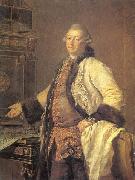 |
Dmitry Levitzky
|
|
1735-1822) was a Russian-Ukrainian portrait painter.
Dmitry was born in Kiev, Ukraine, in a family of clergyman and engraver Grigory Levitzky. His father was his first art teacher. Later be became a pupil of Aleksey Antropov who came to Kiev to paint the Cathedral of St. Andrew.
In 1770, Levitzky became famous as a portrait painter after the exhibition of six of his portraits in the Imperial Academy of Arts in St. Petersburg. For the portrait of Alexander Kokorinov, Director and First Rector of the Academy of Arts in St. Petersburg (1769) he was elected an academician and appointed the Professor of the portrait painting class at the Academy of Arts. |
|
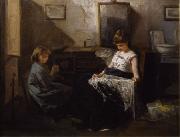 |
Domenico Induno
|
|
(1815 - 1878) was an Italian painter, originally a goldsmith.
He was born and died in Milan, and studied in the Academy of Fine Arts in Milan, as well as under Luigi Sabatelli and at Rome. He tried successively the Neoclassicism and Romantic schools, but afterwards settled down to depict popular life at Milan. In 1848 he took part with the Revolution, and had in consequence to flee to Switzerland. Thence he passed to Tuscany, and did not return home until 1859. His brother Gerolamo Induno was also a painter. Domenico married the sister of the Swiss painter Angelo Trezzini. Domenico often painted patriotic canvases, in a style indebted both to Ingres and Francesco Hayez. Among his paintings are:
|
|
|
|
|
|
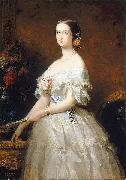 |
Edouard Louis Dubufe
|
|
Edouard Louis Dubufe (30 April 1820 - 11 August 1883) was a French painter.
He learned the art of painting from his father, Claude Marie Dubufe.
Until the 1840s, he painted primarily historical and biblical scenes, then switched to portrait painting. |
|
|
|
|
|
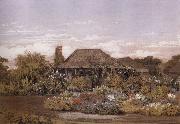 |
Edward La Trobe Bateman
|
|
book illuminator, draughtsman, architectural decorator and garden designer.
English
c.1815-1897
|
|
 |
Edward lamson Henry
|
|
A popular and prolific genre artists at the end of the 19th century
American , 181-1919
|
|
|
|
|
|
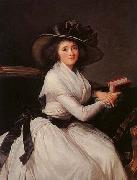 |
eisabeth Vige-Lebrun
|
|
(Marie Élisabeth Louise; 16 April 1755 - 30 March 1842) was a French painter, and is recognized as the most famous female painter of the 18th century. Her style is generally considered Rococo and shows interest in the subject of neoclassical painting. Vigee Le Brun cannot be considered a pure Neoclassist, however, in that she creates mostly portraits in Neoclassical dress rather than the History painting. In her choice of color and style while serving as the portrait painter to Marie Antoinette, Vigee |
|
|
|
|
|
|
|
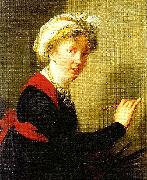 |
elisabeth vigee-lebrun
|
|
Élisabeth-Louise Vigee-Le Brun, född 16 april 1755 i Paris, död 30 mars 1842 i Louveciennes, 20 kilometer väster om Paris, var en fransk målare som i huvudsak målade porträtt.
Vigee-Lebrun utförde tilldragande, idealiserande porträtt och var för en tid hovmålare hos drottning Marie Antoinette. Vigee-Lebrun var tvungen att lämna Frankrike pågrund av den franska revolutionen 1789 och efter det var hon verksam i Ryssland, Italien och Storbritannien. Efter att Napoleons kommit till makten återvände hon till Frankrike. Hon besökte Schweiz 1807 där hon i Geneve blev invald som hedersmedlem i Societe pour l'Avancement des Beaux-Arts.
Vigee-Le Brun lämnade ett arv av 660 porträttmålningar och 200 landskapsmålningar. Dessa finns i privata samlingar i Europa och USA men även i stora museer som Eremitaget, National Gallery i London, Metropolitan Museum of Art i New York och National Gallery of Art i Washington, D.C.. |
|
|
|







